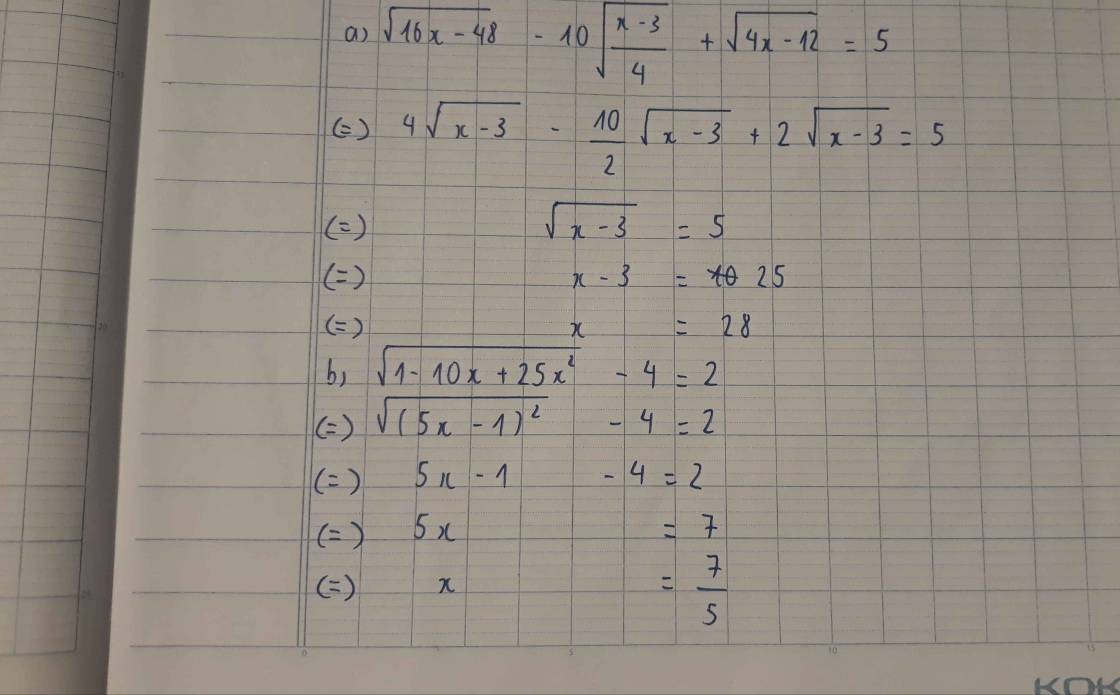Hãy nhập câu hỏi của bạn vào đây, nếu là tài khoản VIP, bạn sẽ được ưu tiên trả lời.

\(=\dfrac{8-4\sqrt{3}-3\left(\sqrt{3}-1\right)-2}{\sqrt{3}-1-2}=\dfrac{6-4\sqrt{3}-3\sqrt{3}+3}{\sqrt{3}-3}\)
\(=\dfrac{-7\sqrt{3}+3}{\sqrt{3}-3}=3\sqrt{3}+2\)

1: \(1+\sqrt{6+2\sqrt{5}}=\sqrt{5}+2\)
2: \(\sqrt{7-2\sqrt{10}}+\sqrt{2}=\sqrt{5}\)
3: \(\sqrt{7+4\sqrt{3}}=2+\sqrt{3}\)

b) (4√x + 4)/(x + 2√x + 5) ≥ 1
⇔ (4√x + 4)/(x + 2√x + 5) - 1 ≤ 0
Do x ≥ 0 ⇒ x + 2√x + 5 > 0
⇒ (4√x + 4)/(x + 2√x + 5) - 1 ≤ 0
⇔ (4√x + 4) - (x + 2√x + 5) ≤ 0
⇔ 4√x + 4 - x - 2√x - 5 ≤ 0
⇔ -x + 2√x - 1 ≤ 0
⇔ -(x - 2√x + 1) ≤ 0
⇔ -(√x - 1)² ≤ 0 (luôn đúng)
Vậy (4√x + 4)/(x + 2√x + 5) ≤ 1 với mọi x ≥ 0
a: \(P=\dfrac{x+8\sqrt{x}+8-x-4\sqrt{x}-4}{\sqrt{x}\left(\sqrt{x}+2\right)}:\dfrac{x+\sqrt{x}+3+\sqrt{x}+2}{\sqrt{x}\left(\sqrt{x}+2\right)}\)
\(=\dfrac{4\left(\sqrt{x}+1\right)}{x+2\sqrt{x}+5}\)
b: 4(căn x+1)>=4
x+2căn x+5>=5
=>P<=4/5<1

Giải bằng bất đẳng thức Cô si: (ĐK: \(x^2-x+1\ge0;-2x^2+x+2\ge0;x^2-4x+7\)
Ta có: \(x^2-x+1+1\ge2\sqrt{x^2-x+1}\Leftrightarrow\sqrt{x^2-x+1}\le\dfrac{x^2-x+2}{2}\left(1\right)\\ T,T:\sqrt{-2x^2+x+2}\le\dfrac{-2x^2+x+3}{2}\left(2\right)\\ \left(1\right);\left(2\right)\Rightarrow\sqrt{x^2-x+1}+\sqrt{-2x^2+x+2}\le\dfrac{x^2-x+2-2x^2+x+3}{2}=\dfrac{-x^2+5}{2}\\ \Rightarrow\sqrt{x^2-x+1}+\sqrt{-2x^2+x+2}-\dfrac{x^2-4x+7}{2}\le\dfrac{-x^2+5-x^2+4x-7}{2}\\
=\dfrac{-2x^2+4x-2}{2}\\
=-x^2+2x-1
\\
\Rightarrow-\left(x-1\right)^2\ge0\)
Điều này chỉ thỏa 1 điều kiên khi x-1=0 ⇔x=1(nhận
Vậy x=1 là nghiệm cuả phương trình

TÍNH : \(\left(\sqrt{2}-1\right)^2-\frac{3}{2}\sqrt{\left(-2\right)^2}+\frac{4\sqrt{2}}{5}+\sqrt{1\frac{11}{25}}.\sqrt{2}\)
\(=\left(\sqrt{2}-1\right)^2-\frac{3}{2}.2+\frac{4\sqrt{2}}{5}+\sqrt{\frac{36}{25}}.\sqrt{2}\)
\(=3-2\sqrt{2}-3+\frac{4\sqrt{2}}{5}+\frac{6\sqrt{2}}{5}=\frac{10\sqrt{2}}{5}-2\sqrt{2}=2\sqrt{2}-2\sqrt{2}=0\)
CHỨNG MINH :
Ta có : \(\sqrt{x}\left(1-\sqrt{x}\right)=-x+\sqrt{x}=-\left[\left(\sqrt{x}\right)^2-2.\sqrt{x}.\frac{1}{2}+\frac{1}{4}\right]+\frac{1}{4}=-\left(\sqrt{x}-\frac{1}{2}\right)^2+\frac{1}{4}\le\frac{1}{4}\)với mọi \(x\ge0\)
Vậy ta có điều phải chứng minh.

\(a,C=\dfrac{2x^2-x-x-1+2-x^2}{x-1}\left(x\ne1\right)\\ C=\dfrac{x^2-2x+1}{x-1}=\dfrac{\left(x-1\right)^2}{x-1}=x-1\\ b,D=\dfrac{1+\sqrt{a}}{\sqrt{a}\left(\sqrt{a}-1\right)}\cdot\dfrac{\left(\sqrt{a}-1\right)^2}{\sqrt{a}+1}\left(a>0;a\ne1\right)\\ D=\dfrac{\sqrt{a}-1}{\sqrt{a}}\)
Có

\(a,\sqrt{4-2\sqrt{3}}-\sqrt{3}=\sqrt{\sqrt{3^2}-2\sqrt{3}+1}-\sqrt{3}=\sqrt{\left(\sqrt{3}-1\right)^2}-\sqrt{3}=\left|\sqrt{3}-1\right|-\sqrt{3}=-1\)
\(b,\dfrac{x^2+2\sqrt{2}x+2}{x^2-2}\left(dk:x\ne\pm\sqrt{2}\right)\\ =\dfrac{x^2+2\sqrt{2}x+\sqrt{2^2}}{x^2-\sqrt{2^2}}\\ =\dfrac{\left(x+\sqrt{2}\right)^2}{\left(x-\sqrt{2}\right)\left(x+\sqrt{2}\right)}\\ =\dfrac{x+\sqrt{2}}{x-\sqrt{2}}\)
\(c,\sqrt{9x^2}-2x\left(dk:x< 0\right)\\ =\sqrt{3^2}.\sqrt{x^2}-2x\\ =3\left|x\right|-2x\\ =-3x-2x\\ =-5x\)
\(d,\sqrt{11+6\sqrt{2}}-3+\sqrt{2}\\ =\sqrt{\sqrt{2^2}+2.3\sqrt{2}+3^2}-3+\sqrt{2}\\ =\sqrt{\left(\sqrt{2}+3\right)^2}-3+\sqrt{2}\\ =\sqrt{2}+3-3+\sqrt{2}\\ =2\sqrt{2}\)
\(e,\dfrac{x^2-5}{x+\sqrt{5}}\left(dk:x\ne-\sqrt{5}\right)\\ =\dfrac{\left(x-\sqrt{5}\right)\left(x+\sqrt{5}\right)}{x+\sqrt{5}}\\ =x-\sqrt{5}\)

a: Đặt \(x^2-4=a\)
Pt sẽ là \(a=3\sqrt{xa}\)
\(\Rightarrow a^2=9xa\)
\(\Leftrightarrow a\left(a-9x\right)=0\)
\(\Leftrightarrow\left(x^2-4\right)\left(x^2-4-9x\right)=0\)
hay \(x\in\left\{2;-2;\dfrac{9+\sqrt{97}}{2};\dfrac{9-\sqrt{97}}{2}\right\}\)
d: Đặt \(\sqrt{x^2-x+1}=a;\sqrt{x^2+x+1}=b\)
Pt sẽ là 2a+b=ab+2
=>(b-2)(1-a)=0
=>b=2 và 1-a
\(\Leftrightarrow\left\{{}\begin{matrix}x^2+x+1=4\\x^2-x+1=1\end{matrix}\right.\Leftrightarrow x\in\varnothing\)
